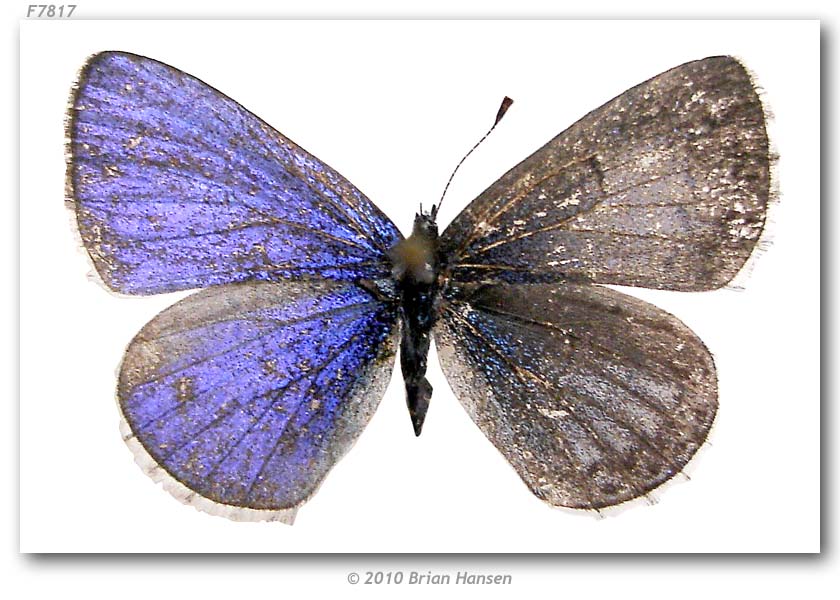A once in a lifetime occurrence, a bilateral gynandromorph. In short, a glitch during cell differentiation creates asymmetrical chromosome patterns, which leads to asymmetrical sex expression in the adult insect. If you haven’t clicked the link above, do so, it’s an excellent description with some awesome photos.
Back to the butterfly. I was in the field this March just above the middle fork of the American River on the hunt for Xanthothrix, with me was Brian Hansen and Bob Patterson. Bob and I were on a mission, to locate a remote patch of Coreopsis high on serpentine soils, and to find our rare little moth. Brian came along to enjoy the day and explore the butterfly fauna. While Bob and I hiked ahead anxious to see if the days hike would be worth it, Brian stopped frequently to net passing leps. It was probably less than an hour out from the car when we hear form behind us on the trail “Hey guys… I think I just caught a gynandromorph!!!” OK, I was skeptical. Bob and I approached to see Brian holding a little blue in his hand, which unmistakably, was a bilateral gynandromorph. I was blown away. Bob has over 50 years of experience as an avid lepidopterist and has never seen one of these in the wild. To make this feat even more impressive, this small blue butterfly is one of the commonest insects in the American west in the spring. Today, they were puddling in great numbers along the trail, and I hadn’t even stopped to blink at one. Brian just netted a one in a million catch. Perhaps it is the curse of a jaded lepidopterist that will keep me from such once in a lifetime discovery; but I know I will be looking closer at even the commonest butterfly as it wings by me.
So as you can see the butterfly is exactly half male and half female (the right side is female). If you look very closely you can even see a perfect vertical line bisecting the body if the insect (looks like a photoshop edit almost), gynandromorphism after-all is expressed throughout the entire body and even the genitalia are contorted into strange shapes.
The specimen is in Brian Hansen’s personal collection, and you can find the images hosted on the Butterflies of America website.



Love this post! Thanks.
Alright. This has FREAKED me OUT! I’ve not heard of gynandromorphs. I must investigate! Wow, super congrats to you for just BEING there and huge props to exceedingly persistent Brian. (seriously, checking calendar if it’s April 1)
What you said about it, though, reminds me of something parallel. I was birding with my mom, for the first time with her, so was going SUPER easy, basically looking at gulls in a parking lot, albeit in Bodega Bay. Normally, I’d NEVER bother to stare extensively through binocular at a pack of gulls in the parking lot.
And I noticed one of them had a weird bill. And I kept staring. And then I freaked.
It was a petrel of some sort. It’s the ONLY TIME in my LIFE I’ve seen one for sure. In the parking lot. Because someone ELSE with me was interested (and me, professional biologist, almost blase). Well, color me re-invigorated to examine the “mundane.” =)
Very nice find!